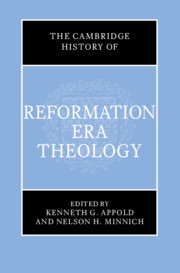Book contents
- The Cambridge History of Reformation-Era Theology
- The Cambridge History of Reformation-Era Theology
- Copyright page
- Contents
- Figures
- Acknowledgments
- Contributors
- Abbreviations
- Introduction
- Part One Theology in an Age of Cultural Transformation
- 1 The Printing Press and its Impact on the Production, Proliferation, and Readership of Theological Literature
- 2 Humanism and Theology
- 3 The Changing Role of the Bible in Theological Discourse
- 4 The Regulation of Theology in the Reformation Era
- 5 Political Change and Theological Discourse
- 6 Universities, Monastic Studia, Academies, Seminaries, and Catechesis
- 7 Para-Academic Theology: Theology of the “Uneducated”
- 8 Gender and Theology in the Reformation Era
- 9 The Theologians and the Clergy: Who Were They?
- Part Two Schools and Emerging Cultures of Theology: Diversity and Conformity within Confessions
- Part Three Topics and Disciplines of Theology
- Index
- References
8 - Gender and Theology in the Reformation Era
from Part One - Theology in an Age of Cultural Transformation
Published online by Cambridge University Press: 27 September 2023
- The Cambridge History of Reformation-Era Theology
- The Cambridge History of Reformation-Era Theology
- Copyright page
- Contents
- Figures
- Acknowledgments
- Contributors
- Abbreviations
- Introduction
- Part One Theology in an Age of Cultural Transformation
- 1 The Printing Press and its Impact on the Production, Proliferation, and Readership of Theological Literature
- 2 Humanism and Theology
- 3 The Changing Role of the Bible in Theological Discourse
- 4 The Regulation of Theology in the Reformation Era
- 5 Political Change and Theological Discourse
- 6 Universities, Monastic Studia, Academies, Seminaries, and Catechesis
- 7 Para-Academic Theology: Theology of the “Uneducated”
- 8 Gender and Theology in the Reformation Era
- 9 The Theologians and the Clergy: Who Were They?
- Part Two Schools and Emerging Cultures of Theology: Diversity and Conformity within Confessions
- Part Three Topics and Disciplines of Theology
- Index
- References
Summary
One used to read, in older studies of women in the Reformation, that women were “silenced” during this period. That view has some merit. Surveying the many authors of the era’s elite theological discourse, women are hard to find. In fact, only one woman of the Reformation era has been acknowledged by her own tradition as a “doctor of the church,” and thereby identified as an authoritative contributor to doctrinal theology. She is Teresa of Ávila (1515–1582), and it did not happen until 1970.
- Type
- Chapter
- Information
- The Cambridge History of Reformation Era Theology , pp. 134 - 148Publisher: Cambridge University PressPrint publication year: 2023

